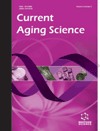-
s Effects of ε4 on Object Recognition in the Non-Demented Elderly
- Source: Current Aging Science, Volume 3, Issue 2, Jul 2010, p. 127 - 137
-
- 01 Jul 2010
Abstract
Previously we reported that Apolipoprotein E (ApoE) ε4 negatively affects performance in the novel-image-novel- location (NINL) object recognition test in healthy non-demented elderly human study participants. In this study, the participants were invited to return for testing sessions 6 and 18 months after the baseline session. Using a longitudinal study design, effects of ε4 on NINL test performance were assessed in study “dropouts”, participants that did not return for the second and/or third session(s), and “finishers”, participants that returned for all sessions. There were effects of ε4 on dropout rates and NINL total scores as well as sub-scores in both dropouts and finishers. NINL total score was a predictor of ε4 participant dropout. Compared to non-ε4 dropouts, ε4 dropouts had lower NINL scores. In contrast, ε4 finishers had higher NINL scores than non-ε4 finishers. Thus, the NINL test could be a valuable tool in detecting preclinical signs of age-related cognitive impairments, particularly those associated with ε4 risk.


